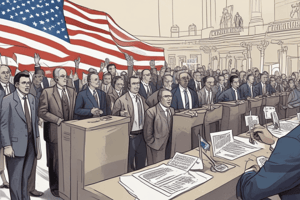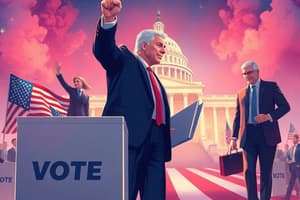Podcast
Questions and Answers
What is the primary reason why individual citizens' participation in policy making is often overlooked in analysis?
What is the primary reason why individual citizens' participation in policy making is often overlooked in analysis?
- Because they do not have legal authority to make binding policy decisions
- Because they are not as organized as groups in making their preferences clear (correct)
- Because they are not official policy makers
- Because their interests are already represented by political parties
What is the main goal of interest groups in policy making?
What is the main goal of interest groups in policy making?
- To represent the policy preferences of citizens
- To make binding policy decisions
- To influence the actions of official policy actors to gain favorable outcomes (correct)
- To participate in policy making as unofficial actors
Why are political parties considered unofficial actors in policy making?
Why are political parties considered unofficial actors in policy making?
- Because they are not registered with the government
- Because they are not representative of citizens' interests
- Because they are not involved in the policy making process
- Because they do not possess legal authority to make binding policy decisions (correct)
What is the primary role of political parties in policy making?
What is the primary role of political parties in policy making?
What is the characteristic of opportunities for individual participation in policy making?
What is the characteristic of opportunities for individual participation in policy making?
What is the main difference between unofficial actors and official actors in policy making?
What is the main difference between unofficial actors and official actors in policy making?
Why are individual citizens important in the policy making process?
Why are individual citizens important in the policy making process?
What is the relationship between unofficial actors and official actors in policy making?
What is the relationship between unofficial actors and official actors in policy making?
What is the characteristic of the policy making process in the United States?
What is the characteristic of the policy making process in the United States?
What is the role of think tanks in policy making?
What is the role of think tanks in policy making?
Flashcards are hidden until you start studying
Study Notes
Elections and Voter Turnout
- Elections for national office are held every two years, but not all offices are up for election every year.
- Voter turnout is often low, making it difficult to draw conclusions about public preferences.
- Even with high turnout, it's impossible to say that elections broadly reflect public preferences.
- Low voter turnout is a concern among citizens and democratic theorists, as it means many potential voters do not express their opinions.
Political Participation
- Low voter turnout is related to low levels of participation in other political activities.
- Policy makers are sensitive to public opinion, as they may face backlash or lose elections if they make unpopular decisions.
- Overall, political attention and participation are remarkably low.
Motivating Citizens
- People want the most benefits at the least cost, seeking benefits for themselves while spreading the costs among others.
- People can be mobilized to care about particular issues, and nonvoters can be motivated to take action.
- Citizens often act when their livelihood or lifestyle is threatened, such as when new development threatens their neighborhood.
Interest Groups
- Interest groups are important in the policy process, as they magnify individual power.
- The number of interest groups has rapidly expanded since the 1960s.
- Many groups are local, but some are national or even international.
- The American system of democracy makes it relatively easy to form an interest group, but effective activity is expensive.
Interest Group Formation
- Grassroots organizations form frequently to achieve specific goals.
- While anyone can form a group, its mere existence does not guarantee a voice in policy making.
Public Policy Making Process
- The policy-making process involves unofficial actors, including individual citizens, interest groups, and political parties.
- Unofficial actors participate in policy making, but their roles are not fully specified in the Constitution.
- Official actors, such as government agencies, have legal authority to make binding policy decisions.
Studying That Suits You
Use AI to generate personalized quizzes and flashcards to suit your learning preferences.





